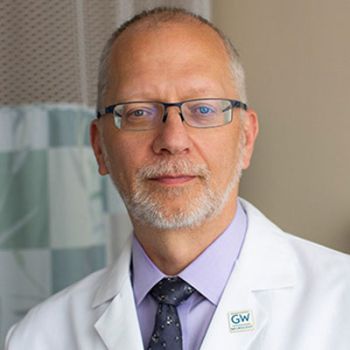
George Washington University’s Henry Kaminski, M.D. was recently published as co-author of a New England Journal of Medicine study finding surgery removing the thymus as an effective treatment for myasthenia gravis.
Myasthenia gravis, an autoimmune disorder Kaminski has dedicated much of his career to researching and treating, causes debilitating muscle weakness and fatigue. The research found surgical removal of the thymus organ reduced patients’ weakness, their need for immunosuppressive drugs, and hospitalizations.
“While surgery is expensive and not without risk, this research will empower patients and their doctors to make informed decisions regarding treatment,” said Kaminski, chair of the Department of Neurology and Meta Amalia Neumann Professor at the George Washington University School of Medicine and Health Sciences.
Myasthenia gravis, which affects as many as 60,000 Americans, includes symptoms such as droopy eyelids, blurred or doubled vision, difficulty talking, swallowing, breathing, and neck and limb movements. Over the last several decades, studies have suggested removing the thymus may reduce these symptoms. However, this is the first randomized study of thymectomy in myasthenia gravis patients, giving clinical evidence that the surgery does in fact benefit patients.
“These findings solidly confirm the early use of thymectomy in managing myasthenia gravis,” said Gil I. Wolfe, M.D., first author and Irvin and Rosemary Smith Chair of the Department of Neurology in the Jacobs School of Medicine and Biomedical Sciences at the University at Buffalo, in a release. “These findings tell patients they can be even more assured that thymectomy is a positive step to take in the management of their condition.”
The study was conducted with 126 patients between 2006 and 2012, between 18-65 years of age. Patients were selected for the study if they had the disease for fewer than five years, elevated levels of acetylcholine receptor antibodies and no thymomas. Neurologists and thoracic surgeons worked together at 67 centers in 18 countries to compare the combination of surgery and immunosuppression with the drug prednisone with prednisone treatment alone. They found that patients who had surgery required lower daily doses of prednisone and had less need for additional immunosuppressant drugs. Surgery also reduced the occurrence of adverse events, such as hospitalizations.
Wolfe and Kaminski were part of the trial leadership, which also included the late John Newsom-Davis, M.D., Oxford University, U.K.; Gary R. Cutter, M.S., Ph.D., University of Alabama, Birmingham, Alabama; the late Alfred Jaretzki III, M.D., and Joshua R. Sonett, M.D., Columbia University Medical Center, New York City.
The research was funded in part by the National Institutes for Health.
“Randomized Trial of Thymectomy in Myasthenia Gravis” was published in The New England Journal of Medicine.


